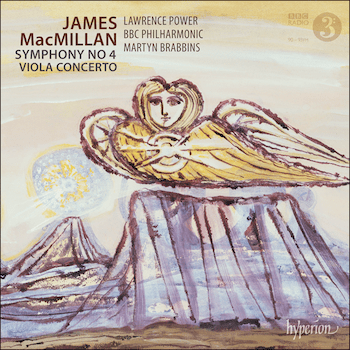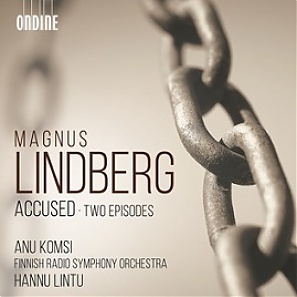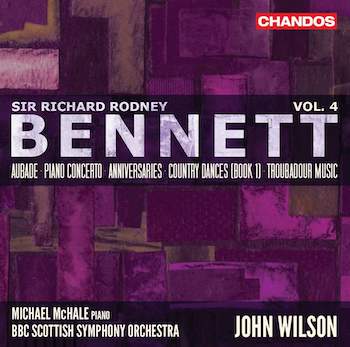Classical CD Reviews: James MacMillan’s Viola Concerto, Magnus Lindberg’s “Accused,” and Richard Rodney Bennett Orchestral Works
By Jonathan Blumhofer
James MacMillan’s Viola Concerto is a magnificent addition to the repertoire; the debut recording of Magnus Lindberg’s song cycle Accused leaves a bit to be desired; a fetching, brilliant gathering of orchestral music by Sir Richard Rodney Bennett.
 It’s been a good last hundred years or so for the viola: from William Walton and Belá Bartók to Miklós Rózsa and, now, James MacMillan, the instrument has been well served in the concerto genre. MacMillan’s 2013 Viola Concerto, out now in its debut recording and featuring dedicatee Lawrence Power in the solo part, is a magnificent addition to the repertoire.
It’s been a good last hundred years or so for the viola: from William Walton and Belá Bartók to Miklós Rózsa and, now, James MacMillan, the instrument has been well served in the concerto genre. MacMillan’s 2013 Viola Concerto, out now in its debut recording and featuring dedicatee Lawrence Power in the solo part, is a magnificent addition to the repertoire.
His Concerto is, essentially, a traditional piece. Its three movements are each motivically tight, structurally familiar, and formally clear. MacMillan’s writing is imbued with its typically strong sense of dramatic shape and brims with virtuosity that never feels excessive or gratuitous. Best, as conventional as the Concerto might appear, it’s never dull.
The first movement broods darkly and soulfully. In the second, there’s a gorgeous gymnopedie-esque waltz marked by falling glissandos that are interrupted by an abrasive, almost mechanical gesture. The finale, with its robust, athletic opening and tragic central section, builds to a climax that recalls the Scottish folk music that MacMillan is so fond of drawing upon, before culminating in an ecstatic, driving coda.
Power’s command of the solo part fits like a glove. He brings a richness of tone and precision of intonation that wouldn’t be out of place in Berlioz’s Harold in Italie or Mozart’s Sinfonia concertante and applies them to MacMillan’s idiom. The results are invigorating, particularly in the dreamy slow movement and the passionate denouement of the finale.
Martyn Brabbins leads the BBC Philharmonic (BBCPO) in a stirringly discreet account of the accompaniment. The soloist is never covered by MacMillan’s sometimes-thick scoring, and the Concerto’s most striking moments – like the viola- and cello-section dialogues with Power in the outer movements and the piercing interjections of the central one – speak with biting expressive clarity.
Brabbins and the BBCPO fill out the disc with a lucid, energetic reading of MacMillan’s Symphony no. 4. Written in 2014-15, MacMillan’s Fourth evokes the sound world of the Renaissance almost as much as it calls to mind the rhythmic gestures of Stravinsky and the harmonic sound world of Ives.
Like the Concerto, the Symphony’s materials are thoroughly developed and colorfully scored. Its allusions to Scottish folk music and some prominent writing for solo viola make for an intelligent pairing with the earlier piece. Still, clocking in at around 40 minutes, the Fourth rambles a bit and overstays its welcome. Its ecstatic, radiant apotheosis, in particular, doesn’t quite fit.
That said, Brabbins’s rendition is hard to argue with and, even if the Symphony might leave a bit to be desired, it gets a great performance. Above all, so does the Concerto.
 There’s more than a little to admire about the concept of Magnus Lindberg’s 2014 song cycle Accused. Setting three interrogative transcripts that span just over two hundred years (from Mademoiselle Théroigne de Méricourt during the French Revolution to an anonymous Stasi interrogation in East Germany during the 1960s, and the trial of Chelsea Manning in 2013), it’s a score that endeavors to be timely and politically relevant, not to mention dramatically riveting.
There’s more than a little to admire about the concept of Magnus Lindberg’s 2014 song cycle Accused. Setting three interrogative transcripts that span just over two hundred years (from Mademoiselle Théroigne de Méricourt during the French Revolution to an anonymous Stasi interrogation in East Germany during the 1960s, and the trial of Chelsea Manning in 2013), it’s a score that endeavors to be timely and politically relevant, not to mention dramatically riveting.
In practice, though, the piece’s debut recording leaves a bit to be desired.
That’s not to knock the performers or performances. Soprano Anu Komsi navigates Lindberg’s treacherously agile vocal writing with an ease and precision that is as breathtaking as it is unsettling. Suffice it to say, her command of the music’s diction, dynamics, intonation, and range (her part runs from a G-sharp below the staff to an E-flat above it) is all but total (thanks to some shady English enunciation in the finale).
And Hannu Lintu draws playing from the Finnish Radio Symphony Orchestra (FRSO) that is lean, beautifully balanced, and wonderfully directed.
No, the problems with Accused seem to stem from the text and Lindberg’s apparent uncomfortableness with it. That’s most obvious in the closing Manning movement where his recitative-like writing, paired with the libretto’s Question & Answer format, simply doesn’t hold up over 17 minutes: virtually the whole part (a lyrical vocalise at the end notwithstanding) comes across as stilted, pedantic, and emotionally dry.
The Stasi interrogation in Part 2 likewise doesn’t bring enough expressive or dramatic heat, even as the orchestral writing recalls some of Lindberg’s finer orchestral essays (like Feria and Al largo). Only the opening Méricourt movement packs a consistent punch, and that thanks to a mix of its brevity and a verismo-modern orchestral introduction.
For contrast, check out the purely instrumental Two Episodes (from 2016) that fills out the disc. Here, Lindberg’s clearly working in his comfort zone. Written as an introduction to Beethoven’s Ninth Symphony, the piece subtly incorporates the falling fifths that open the earlier score. In the process, Two Episodes takes some surprising turns: luxurious, Ravel-esque moments before the end of the first Episode and some fresh, whimsical woodwind writing in the second, among them.
In sum, Two Episodes is a fine piece. Its best moments are the most sensuous ones. Lintu and the FRSO play those up with a fervency that’s balanced by the playfulness (especially) of the finale. If only such beguiling juxtapositions of musical character and style also marked Accused.
 The BBC Scottish Symphony Orchestra (BBCSSO) and John Wilson turn in a series of lived-in performances in this fourth volume of Chandos’s survey of the orchestral music of Sir Richard Rodney Bennett. Best known for his film scores, Bennett was an accomplished composer of concert music (he was, famously, the only student of Pierre Boulez), as this latest installment of the British label’s series attests.
The BBC Scottish Symphony Orchestra (BBCSSO) and John Wilson turn in a series of lived-in performances in this fourth volume of Chandos’s survey of the orchestral music of Sir Richard Rodney Bennett. Best known for his film scores, Bennett was an accomplished composer of concert music (he was, famously, the only student of Pierre Boulez), as this latest installment of the British label’s series attests.
Its oldest fare – 1964’s Aubade, the 1968 Piano Concerto, and 1982’s Anniversaries – belong, decidedly, to the world of the post–World War 2 avant-garde. The latter two works, in particular, are often enough edgy, brash, astringent, and dissonant.
That said, they’re also catching, ingratiating, brilliantly scored, and soundly written.
In his Piano Concerto, for instance, Bennett’s writing ranges from shimmering and delicate in the first movement to jaunty and a bit menacing in the second. The slow third is desolate and haunting, while the finale offers a terrific sense of release and exuberance. Throughout, though, the writing is consistently lyrical. Bennett demonstrates an exquisite understanding of sonic space – as well as a strong command of gesture and pacing – in the third. And, running just over 20 minutes, this is a piece that says more than a terrific amount of (often more verbose) contemporaneous literature.
Likewise, the 17-minute-long Anniversaries (essentially a brief Concerto for Orchestra) weave a brilliant tapestry of lithe woodwinds riffs, intense strings melodies, and snarling, aggressive brass fanfares.
Bennett’s later efforts, represented here by 2001’s Country Dances and 2006’s Troubadour Music, offer a genial contrast. The latter is fresh and sprightly. In the former, a lush, fluent “A New Dance” gamely counters the rhythmically taut “Enfield Common,” which, in turn, is balanced out by a gorgeous, flowing “Chelsea Reach” and the lusty concluding “Nobody’s Jig.”
Wilson and his forces have all of this music – particularly the demanding Anniversaries and the surging, lamenting melodic lines of Aubade – completely in hand. Michael McHale proves an excellent soloist in the Concerto: the score’s florid passagework and strong sense of character come across potently. In all, then, a fetching, brilliant collection.
Jonathan Blumhofer is a composer and violist who has been active in the greater Boston area since 2004. His music has received numerous awards and been performed by various ensembles, including the American Composers Orchestra, Kiev Philharmonic, Camerata Chicago, Xanthos Ensemble, and Juventas New Music Group. Since receiving his doctorate from Boston University in 2010, Jon has taught at Clark University, Worcester Polytechnic Institute, and online for the University of Phoenix, in addition to writing music criticism for the Worcester Telegram & Gazette.
